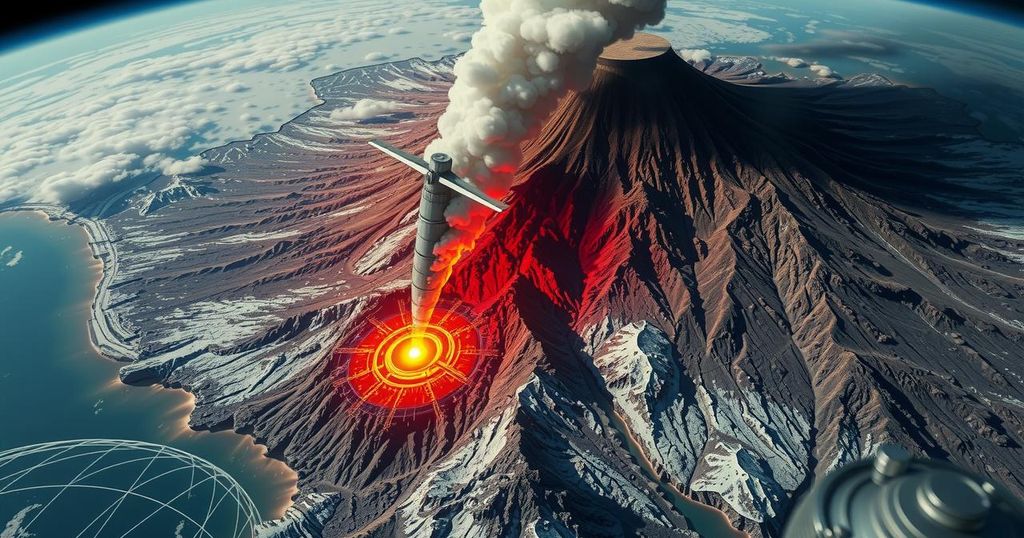World news
ABBAS SHERAQI, ABOMSA, AFRA, AFRICA, AP, BBC, CAIRO UNIVERSITY, CLIMATE, CLIMATE CHANGE, EARTHQUAKES, EGYPT, EGYPTIAN GEO, ETHIOPIA, ETHIOPIA GEOLOGICAL INSTITUTE, ETHIOPIAN GEOLOGICAL INSTITUTE, FENTALE, FLOODING, NATURAL DISASTERS, RENAISSANCE DAM, SHERAQI, US GEOLOGICAL SURVEY, USGS
Michael Grant
0 Comments
Magnitude-5.8 Earthquake and Volcanic Eruption Impacts Ethiopia, Raises Concerns Over Renaissance Dam
A magnitude-5.8 earthquake struck near Addis Ababa, Ethiopia, on January 4, 2025, prompting evacuations and raising concerns of future seismic activity as Mount Dofan erupts. Ongoing disputes over the Renaissance Dam add to tensions in the region.
On January 4, 2025, a magnitude-5.8 earthquake struck Ethiopia, specifically affecting areas near Abomsa and Amhara in the Afar region, close to the capital city, Addis Ababa. The United States Geological Survey (USGS) and the Ethiopia Geological Institute reported that the epicenter was located at a depth of 10 kilometers. Researchers in seismology suggested that the seismic activity could intensify. The tremors have been documented to progressively increase in magnitude, as mentioned by a Canadian earthquake researcher who noted the escalation from earlier measured magnitudes of 5.2 and 5.5 to the most recent 5.8.
Concurrently, Mount Dofan in the Afar region erupted, leading to the formation of large fissures in the ground, prompting governmental authorities to evacuate numerous residents to temporary shelters. Abbas Sheraqi, a geologist from Cairo University, expressed concerns that the ongoing seismic activity may herald additional eruptions, potentially threatening surrounding areas and volcanoes, including the populated Fentale region to the south.
Sheraqi articulated apprehensions regarding the impact on the Renaissance Dam, emphasizing the safety of Ethiopian citizens but highlighting potential risks to neighboring Sudan. He stated, “We do not wish for the Renaissance Dam to collapse, as our brothers in Ethiopia live safely far from the dam.” Complications from the dam’s operation have been an ongoing concern in negotiations between Ethiopia, Egypt, and Sudan, which have persisted for over a decade without a satisfactory resolution. In recent discussions, Egypt expressed frustration over Ethiopia’s refusal to accept mutually beneficial technical or legal agreements regarding the Grand Ethiopian Renaissance Dam (GERD).
The geological context of earthquakes in Ethiopia points to a region that experiences significant seismic activity due to tectonic plate movements. The recent earthquake is part of a series of tremors that have raised concerns among researchers about potential larger aftershocks. Simultaneously, volcanic eruptions in the same region exacerbate concerns about the safety of nearby populations and infrastructure, such as the Renaissance Dam, amid ongoing diplomatic tensions between Ethiopia and its neighboring countries, especially concerning water rights and resource management.
In summary, the recent magnitude-5.8 earthquake in Ethiopia, accompanied by the eruption of Mount Dofan, has prompted urgent evacuations and raised alarms among scientists regarding potential future seismic events. As the situation evolves, the implications of these natural disasters could compromise not only public safety but also the delicate diplomatic landscape surrounding the Grand Ethiopian Renaissance Dam, which has been a focal point of contention among Ethiopia, Egypt, and Sudan.
Original Source: www.egypttoday.com




Post Comment